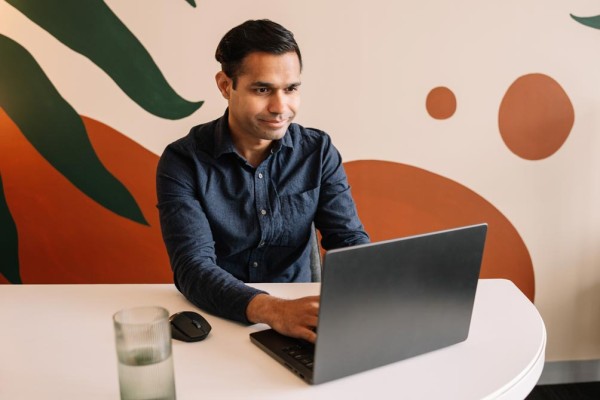Freelancing lets you earn money your way, making it a great option for young people looking to gain experience and earn extra cash. But is it the right fit for you? Let’s break it down.
What is freelancing?
Freelancing is a flexible way of working where you offer your skills or services to different clients without being tied to an employer. Instead of having a permanent job, you work on short-term projects or contracts.
Freelancers are self-employed, usually working solo, and don’t run a structured business with employees. They typically use their existing skills - such as writing, graphic design, coding, tutoring or photography - to complete projects for different clients.
Freelancing gives you the flexibility to choose the work you take on, but it does require having a skill or service that people are willing to pay for. It’s different from running your own business, as freelancers typically work on a project-by-project basis rather than building a structured company. If you’re interested in starting your own business, you can check out Youth Central to learn more about what’s involved.
Deciding if freelancing is right for you
Freelancing has its perks and challenges, and whether it’s right for you depends on your goals and lifestyle.
Benefits of freelancing
- Freelancing allows you to turn your skills into income by getting paid for what you love doing.
- You have the freedom to be your own boss - working from anywhere, choosing how much work you take on, and setting your own schedule.
- It can be a flexible way to earn money while studying or working a casual job, but it’s important to make sure you don’t take on too much at once.
- You’ll develop valuable skills like time management, networking and marketing that can benefit you in any career.
- Your earnings can grow as you gain experience and take on more clients.
Challenges of freelancing
- Getting started can be hard work. Finding clients takes time while you build a name for yourself, and you may need to learn new skills to succeed.
- Income can be inconsistent, especially when you’re just starting out, and there are no paid holidays or sick leave if you can’t work unexpectedly.
- It’s easy to overwork or fall behind if you’re not careful. Since you set your own hours, self-discipline is really important.
- Building a freelance career takes time, and things don’t always go to plan. Having a backup option - like casual work or other income - can give you stability while you grow your client base.
If freelancing feels like the right fit for you, keep reading for some tips on how you might get started.

Tips on how to get started freelancing
1. Know your strengths and what you can offer
Before jumping into freelancing, it’s important to take a step back and think about your skills and what you’re good at. Freelancers are most successful when they can offer something that people need or find useful, so take the time to assess what you can bring to the table.
Talk to people you trust
Start by speaking with friends, family, or someone with freelancing experience. They can offer advice, share insights, and might be able to help you identify strengths you haven't considered.
Assess your skills
Think about what you're good at - whether it’s writing, pet sitting, video editing, personal training, or something else. Identifying your skills can help you figure out what freelance work would suit you.
Consider your availability
Freelancing can be flexible, but it’s still important to know how much time you can realistically offer while still maintaining a healthy work, life, and study balance.
Do your research
Before diving in, you might want to browse some freelance platforms to get an idea of what types of jobs are available and what skills are in demand. Consider how many others are offering similar services and think about what you could bring to the table that’s unique. This can help you figure out if freelancing is a good fit for you and whether your skills are in demand.
Be open to learning
It’s important to remember that not everything you try will work straight away, and that’s okay. Freelancing takes time and persistence, and sometimes it means adjusting your approach or looking for a new niche. But don’t be discouraged - every experience is a chance to learn and grow.
By assessing your skills, researching the market, and talking to others, you’ll be better prepared to take the next step toward freelancing.
2. Build your portfolio
A portfolio is a collection of your work that showcases your skills and experience to potential clients. It can include examples of past projects, testimonials, or anything that highlights what you can do. You don’t need a lot of examples at first - just enough to demonstrate your abilities and make a strong first impression.
A portfolio can take many forms, such as a physical display, a personal website, a social media page, a digital PDF, or an online profile on a freelancing platform. Choose a format that best showcases your work and is easy for potential clients to access. If you’ve already completed work for someone (paid or unpaid), ask if they’re happy for you to include it in your portfolio. If not, consider creating sample work that showcases what you can do.
For example:
- A graphic designer might create mock logos for a fictional brand
- A writer could share blog posts or articles on a personal website
- A pet sitter could collect testimonials from happy pet owners
Positive feedback from people you’ve worked for can go a long way in building trust with new clients. If you’ve done work for someone, ask if they’d be comfortable providing a short testimonial or reference. Always get permission before sharing names, images or details publicly.
A portfolio grows over time, so don’t stress about making it perfect right away. Start with what you have and update it as you gain more experience.

3. Finding freelance opportunities
When it comes to finding freelance work, there are two main approaches:
- Using freelance platforms – Websites like Upwork, Fiverr, and Airtasker connect freelancers with clients who need specific tasks done. These platforms offer a steady flow of job opportunities across different industries, from creative work to admin tasks.
- Creating your own opportunities – Some freelancers build direct relationships with clients through networking, social media, or word of mouth.
Building connections is just as important as showcasing your work. Attending local events, expos, or meetups can help you meet potential clients and even give you a chance to display your work in person. By attending these events, you might also meet other freelancers in the industry who may have some tips and tricks for you.
Freelance platforms can make it easier to find work, especially when you're starting out. They allow you to browse jobs, submit proposals, and get paid securely - but it’s important to understand how they work before you dive in.
Here are some things to consider:
- Fees and commissions – Many platforms charge service fees, which are deducted from your earnings. For example, Fiverr and Upwork take a percentage of your payment for each completed job.
- Rules and guidelines – Each platform has specific terms you need to follow, such as how you communicate with clients and how payments are handled. Make sure to read these carefully and follow them to avoid issues like account restrictions, loss of earnings, or additional fees.
If you prefer to create your own opportunities, there are lots of ways to find clients on your own:
- Social media and community pages – Share your services on local Facebook job groups, Instagram or LinkedIn. There may also be local online marketplaces or forums in your area where you can advertise your skills.
- Community boards and events – Physical spaces like libraries, community centres or local cafes often have boards where you can post about the services you offer. Attending local events or markets can also help you meet potential clients.
Stay safe while searching for freelance work
Be mindful of scams when looking for freelance opportunities online. If something feels too good to be true (like promises of quick cash) or makes you worried (like requests for large upfront fees), it’s worth double checking. Stick to reputable platforms and always research the legitimacy of potential clients. For more information on recognising scams, check out Scamwatch.
4. Handling finances
Managing your money is an important part of freelancing. Here’s what to keep in mind:
Setting your rates
On most freelance platforms, clients set a budget for their projects - so you don’t need to worry too much about pricing and can focus on finding opportunities that match your skills and what you’re comfortable earning.
When working independently, it's important to research what others in your field are charging for similar services. Freelance platforms often provide resources to help with pricing decisions. For example, Freelancing Hub Australia offers guidance on how to price your services.
Managing payments
Keeping track of payments is key to staying organised. Many freelancers use trusted payment platforms like PayPal or direct bank transfers - just be aware that these services may charge fees. Before starting any work, agree on clear payment terms with your client, including how and when you’ll be paid. It’s also helpful to keep a record of all your income and expenses, which will make managing your finances (and doing your taxes) easier down the track.
Taxes and superannuation
In Australia, freelancers are responsible for their own taxes and super. You’ll need an Australian Business Number (ABN) to invoice clients, and since tax isn’t automatically deducted like in other jobs, it’s important to set aside a portion of each payment.
You also won’t have an employer contributing to your superannuation, so consider making your own contributions to plan for the future.
Speaking with a professional, like an accountant, can help you understand your financial obligations and stay on top of everything.
Managing your finances might seem tricky at first, but getting organised early will make freelancing easier in the long run. For more details, check out the Australian Taxation Office (ATO).
5. Legal considerations for freelancers
Understanding the legal side of freelancing is important to protect yourself and your work. While it may seem complicated at first, knowing your rights and responsibilities will help you feel more confident and prepared.
Contracts
A contract is a written agreement between you and your client that outlines the work you’ll do, payment details, deadlines, and other important terms. If you’re using a freelance platform, these contracts are often provided for you. But if you’re finding your own clients, you might want to create a simple contract to protect yourself. Having an agreement is not mandatory, but it does help prevent misunderstandings and ensures you and your client are on the same page.
For more information on creating freelance agreements, visit Wonder Legal Australia.
Licences and permits
Depending on the type of work you do, you may need specific licences or permits to operate legally. It’s a good idea to check the requirements relevant to your work through the Australian Business Licence and Information Service (ABLIS).
Intellectual property
If you create original work - like designs, writing, or photography - it’s important to understand your intellectual property (IP) rights. In most cases, you automatically own the rights to what you create unless you agree otherwise in a contract. You can learn more about protecting your work through IP Australia.
Freelancing as an international student or visa holder
If you’re an international student or visa holder in Australia, there may be restrictions on the type of work you can do and how many hours you’re allowed to work. It’s important to check the conditions of your visa to ensure freelancing is permitted. For the most accurate and up-to-date information, visit the Department of Home Affairs.
Another great resource to check out is this comprehensive guide to freelancing in Australia which covers everything from legal requirements, business structure options, tax obligations and more.

6. Finding balance as a freelancer
Freelancing can offer flexibility and freedom, but it’s important to balance work with the rest of your life. It can be easy to take on too much, especially when you’re just starting out. Being realistic about your availability and capacity can help you avoid burnout and keep your work enjoyable.
Try to set clear boundaries between your work and personal time. This might mean deciding how many hours you’ll work each week and scheduling time for rest and social activities. Taking regular breaks and giving yourself time to recharge will help you stay productive and motivated.
It’s also okay to say ‘no’ to work if you’re feeling overwhelmed. Prioritising your wellbeing is just as important as building your freelance career. If you’re struggling or need someone to talk to, there are resources available to support your mental health. You can visit eheadspace or find your nearest headspace centre or for help and guidance via phone or webchat.
Freelancing can be a great opportunity to use your skills, gain experience, and work on your own terms. By understanding these basics and planning carefully, you’ll be better prepared to navigate the freelance world and find success.
If you’re unsure about where to start or need extra guidance, headspace is here to help.
Get support
If you're aged 15 – 25, headspace Work & Study programs are tailored to your needs and can support you in developing the skills and confidence to reach your work or study goals.
They’re totally free and we have options for you to participate online via webchat, video chat or phone, as well as in-person at over 50 of our headspace centres.
Find out more to help you decide which headspace Work & Study program best suits your needs. If you’re not sure and would like to discuss your options, give us a call on 1800 810 794.
Access eheadspace for support with your mental health online or over the phone, or find your nearest headspace centre.
The headspace Content Reference Group oversee and approve resources made available on this website.
Last reviewed April 2025.
- Australia’s Freelancing Hub. (n.d). https://www.freelancing.com.au/
- Australia’s Freelancing Hub. (n.d). Best Freelancing Tips for Beginners. https://www.freelancing.com.au/best-freelancing-tips-for-beginners/
- Indeed. (2024, April 19). Best Freelance Jobs You Can Pursue (With Skills Guide). https://au.indeed.com/career-advice/finding-a-job/best-freelance-jobs
- SEEK. (2024, February 28). A guide to freelancing: Tips, strategies and advice. https://www.seek.com.au/career-advice/article/freelancing
- SEEK. (2024, February 28). How freelancing works: Types of jobs, benefits and challenges. https://www.seek.com.au/career-advice/article/what-is-freelancing
- Xero. (n.d). How to start as a freelancer. https://www.xero.com/au/guides/how-to-freelance/
Get professional support
If you feel you need help there are a range of ways we can support you.
